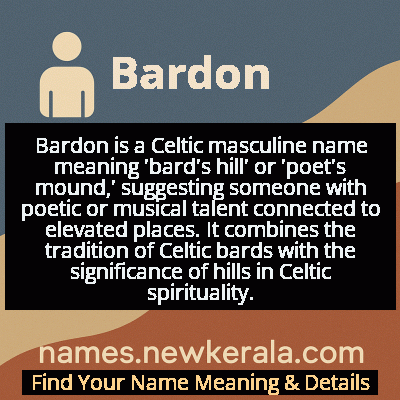Bardon Name Meaning & Details
Origin, Popularity, Numerology Analysis & Name Meaning of Bardon
Discover the origin, meaning, and cultural significance of the name BARDON. Delve into its historical roots and explore the lasting impact it has had on communities and traditions.
Name
Bardon
Gender
Male
Origin
Celtic
Lucky Number
9
Meaning of the Name - Bardon
Bardon is a Celtic masculine name meaning 'bard's hill' or 'poet's mound,' suggesting someone with poetic or musical talent connected to elevated places. It combines the tradition of Celtic bards with the significance of hills in Celtic spirituality.
Bardon - Complete Numerology Analysis
Your Numerology Number
Based on Pythagorean Numerology System
Ruling Planet
Mars
Positive Nature
Generous, passionate, energetic, and humanitarian.
Negative Traits
Impulsive, impatient, moody, and can be overly emotional.
Lucky Colours
Red, maroon, scarlet.
Lucky Days
Tuesday.
Lucky Stones
Red coral, garnet.
Harmony Numbers
1, 2, 3, 6.
Best Suited Professions
Military, sports, philanthropy, leadership roles.
What People Like About You
Courage, energy, leadership, generosity.
Famous People Named Bardon
Bardon of Cornwall
Celtic Bard
Legendary Welsh bard and saint who traveled through Cornwall establishing early Christian communities while preserving Celtic poetic traditions
Franz Bardon
Occultist and Writer
Influential Czech esoteric author known for his works on Hermeticism and magical initiation practices
Bardon Green
Modern Musician
Australian folk singer and songwriter known for blending Celtic musical traditions with contemporary folk styles
Name Variations & International Equivalents
Click on blue names to explore their detailed meanings. Gray names with will be available soon.
Cultural & Historical Significance
Throughout Celtic history, names combining 'bard' elements were often given to children expected to continue family traditions of poetry or music, making Bardon a name of cultural responsibility and artistic inheritance. The preservation of stories, genealogies, and historical events through bardic tradition was essential to Celtic identity, and those bearing such names were seen as guardians of collective memory. The geographical element further roots the name in the Celtic concept of dinnseanchas (lore of place names), where landscape features held stories and spiritual significance that bards were responsible for remembering and transmitting.
Extended Personality Analysis
Individuals named Bardon typically exhibit a blend of creative sensitivity and grounded wisdom. They often possess a natural affinity for storytelling, music, or poetry, with an ability to articulate complex emotions and ideas in accessible ways. Their 'hill' or 'mound' association gives them a perspective-oriented nature—they tend to see the bigger picture and provide insightful counsel to others. Bardons are usually excellent listeners who absorb stories and experiences, then transform them into artistic expressions that resonate with diverse audiences. They balance emotional depth with practical awareness, making them both dreamers and doers.
This combination of artistic talent and elevated perspective makes them natural leaders in creative communities and respected voices in group settings. Their creative energy is often channeled into building community and preserving traditions, showing a protective instinct toward cultural heritage while still innovating within their artistic fields. Bardons typically demonstrate patience and persistence in their endeavors, understanding that meaningful art and wisdom often require time to develop fully. They tend to be bridge-builders who can connect different people and ideas through their creative work, and they often serve as mentors or guides to younger artists or those seeking creative expression.
Modern Usage & Popularity
In contemporary times, Bardon remains a relatively uncommon but meaningful choice, particularly among families with Celtic heritage or those drawn to musical and poetic traditions. The name has seen a slight resurgence in recent years as part of the broader trend toward unique, meaningful names with cultural depth, though it remains outside the top 1000 names in most English-speaking countries. It's most popular in Celtic regions like Wales, Scotland, and Ireland, but also appears in diaspora communities in North America and Australia. Modern Bardons often work in creative fields, education, or cultural preservation, though the name's distinctive quality appeals to parents seeking something traditional yet uncommon. Its usage patterns show it's typically chosen by parents who value artistic expression, cultural continuity, and names with historical resonance rather than following popular naming trends, making it a conscious choice that reflects specific values and aspirations for their child's identity.
Symbolic & Spiritual Meanings
Symbolically, Bardon represents the bridge between earthly experience and elevated wisdom, combining the grounded reality of the hill with the transcendent power of artistic expression. The name embodies the concept of 'voice from the high place'—someone who gains perspective through elevation (literally or metaphorically) and shares insights through creative means. It symbolizes cultural memory and the transmission of tradition across generations, serving as a living connection to ancestral wisdom. The combination of bard and hill also suggests stability meeting creativity—the solid foundation of the earth supporting the fluid beauty of artistic expression. In metaphorical terms, Bardon represents the human capacity to transform personal and collective experience into meaningful art that elevates both creator and audience, serving as a reminder that true wisdom comes from both rooted experience and the ability to rise above immediate circumstances to perceive deeper patterns and meanings.

